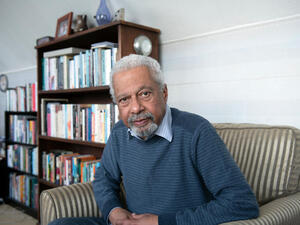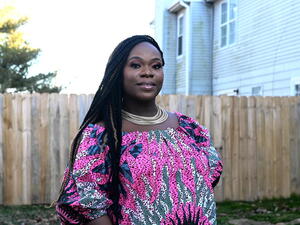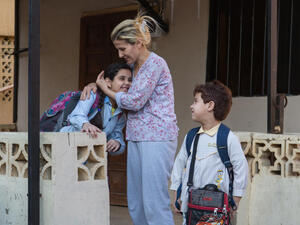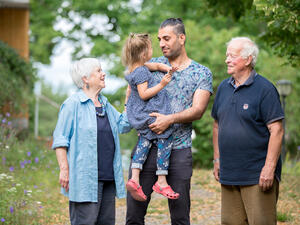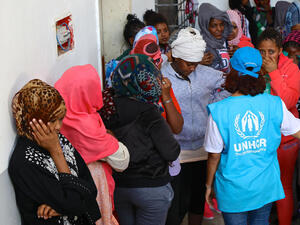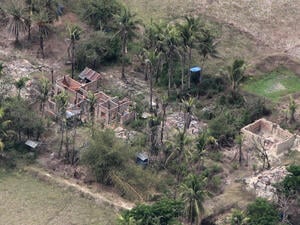UNHCR calls for European leadership to bridge gap between humanitarian assistance and development aid
UNHCR calls for European leadership to bridge gap between humanitarian assistance and development aid

Liberian returnees in Voinjama District are building a school to help restart their lives. But for their return to be sustained they need to be part of a longer-term peace and development process.
BRUSSELS, Feb.22 (UNHCR) - In a speech to the European Parliament this week, UN High Commissioner for Refugees António Guterres called for European Union leadership to ensure an effective transition from emergency humanitarian assistance to development aid.
"The mechanisms of the international community intended to link emergency relief to development are simply not working," Guterres told members of the European Parliament in Brussels on Tuesday. "If we are to provide lasting solutions for problems of forced displacement, this gap must be bridged. I would ask all European institutions and member states to join in an effort to help make this a reality."
Guterres was speaking at a meeting hosted by the European Parliament's Development Committee in conjunction with the Foreign Affairs and Civil Liberties committees.
High Commissioner Guterres stressed the importance of ensuring the effective reintegration of refugees and internally displaced persons.
"Despite pictures of return convoys and empty refugee camps, the return of refugees and internally displaced people is not complete unless they are part of the longer-term peace and development process," he said.
As an example, Guterres cited the Great Lakes region of Africa, where a concerted international effort is needed to break the cycle of poverty, conflict and displacement.
"The flow of refugees returning from Tanzania following last year's elections in Burundi has declined significantly over the past few months as the prospect of drought has threatened the livelihoods of the largely rural population," he said. "Now, we are seeing Burundians crossing the border again into Tanzania, their enthusiasm in returning home outweighed by the impossibility of starting over."
Replying to questions, Guterres stressed it was crucial to develop policies that will make development aid more effective.
"This is not merely a question of funding, but also of global management. In Sub-Saharan Africa, we see conflicts and persecution in many places, massive environmental problems, and the destruction of traditional cultivation patterns. This calls for a comprehensive approach to address the problem of aid effectiveness."
The multiplicity of problems in countries of the South results in complex migratory flows with some 200 million people on the move, among them some in need of protection, Guterres said.
"We need to be able to identify and protect refugees," he said. "But we also need a global approach to migration, one which includes conflict prevention and resolution and the promotion of good governance. And the North has to develop a migration policy."
The High Commissioner said refugee problems faced in Europe are small compared to those of poorer countries such as Tanzania and Pakistan, which shelter millions of refugees. To tackle questions related to asylum-seekers and refugees in Europe, "we need more common sense and less populism," Guterres said.
The failure of the international community to find solutions for forced displacement is tragically evident in the case of internally displaced persons (IDPs). While the number of refugees worldwide has fallen, the number of IDPs has risen to a staggering 25 million. Unlike refugees, they do not benefit from a legal and institutional framework to protect them.
Last December, the United Nations adopted a new approach towards situations of internal displacement, whereby specific UN agencies will take the lead in making sure that the needs of internally displaced people are met. UNHCR has accepted to take the lead role in the sectors of protection, camp management and emergency shelter, for persons displaced by man-made causes.
"This is a new frontier for UNHCR," Guterres told Europarliamentarians. "It will present us with many challenges, so it is crucial that the international community lives up to its commitments to the internally displaced. This is true for financial support, but even more so for political action."
The difficulty in helping IDPs is evident in Sudan, where UNHCR received a mandate for the protection of internally displaced persons in the troubled West Darfur province.
"But the absence of a political solution and a dramatic level of insecurity, despite the African Union's laudable efforts, keep us paralyzed on the ground, unable to fulfil this mandate, desperately witnessing massive violations of human rights and frequent loss of life," Guterres said.
The High Commissioner's words found a warm welcome from the European Parliament.
"The heart-rending fate of the refugees is a question that is linked not only to the EU's development policy but also to human rights and the ability to resolve conflicts," said Luisa Morgantini, Italian MEP and EP Development Committee chairperson.
Spanish MEP Miguel Angel Martinez addressed the High Commissioner directly during the session.
"I have been a refugee myself for a long time," he said. "I fled the dictatorship in my country and have lived in exile in France and Belgium before I was able to return home. Help for refugees is of crucial importance, and for that UNHCR needs the support of civil society and of us all."
By Diederik Kramers
UNHCR Brussels


